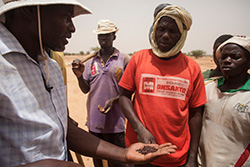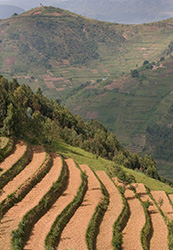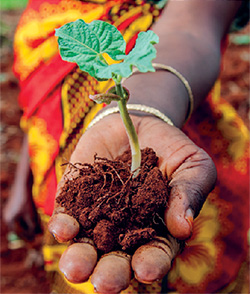UNCCD COP 13
The thirteenth session of the UNCCD Conference of the Parties (COP 13) will be held at Ordos International Convention and Exhibition Center, Ordos, Inner Mongolia, China from 6-16 September 2017. Its high-level segment is scheduled on 11 and 12 September 2017. FAO will be a major participant at the Conference, organizing, co-organizing, and actively participating in a number of events, on a wide ranging number of topics.
Events FAO is organizing and Co-Organizing:
Land use planning as an effective tool for restoration of degraded lands
6 September, 13:00 – 15:00 - Location: MET 05
Includes FAO publication Launch: Land Resources Planning for Sustainable Land Management
 The growing focus on the SDGs calls for a paradigm change in tackling land degradation challenges. A scientific evidence-based approach is crucial to develop, test and implement on the ground SLM options that are technically sound and socio-economically acceptable by multiple land users within the landscape. Land resources and land use planning is crucial to support restoration and management at scale.
The growing focus on the SDGs calls for a paradigm change in tackling land degradation challenges. A scientific evidence-based approach is crucial to develop, test and implement on the ground SLM options that are technically sound and socio-economically acceptable by multiple land users within the landscape. Land resources and land use planning is crucial to support restoration and management at scale.
The first phase of the “Central Asian Countries Initiative for Land Management”, CACILM I (from 2006-2012), established a research program to advance SLM options in Kazakhstan, Kyrgyz Republic, Tajikistan, Turkmenistan, and Uzbekistan. The process was supported among others by FAO, ADB, IFAD and GEF and the research on SLM led by ICARDA-CGIAR, and generated various options suitable for the dominant challenges of different agroecosystems. Further work on the enabling environment, SLM strategies and economics of land degradation is on-going.
Given the diversity of challenges and the dynamic of LD in the region, this knowledge is crucial to support the second phase of CACILM, 2017-2022, which is supported by GEF and led by FAO in collaboration with regional and international partners (IFAS and ICSD, CAREC, GIZ, WOCAT, ZOI, GEF, FAO, CGIAR (ICARDA, ICBA, IWMI, BI)).
Evidence based decision making for scaling-up sustainable land management
8 September, 18:00 - 20:00 - Location: MET-13
Predict, Plan, Prepare: How to Stop Drought from Becoming Famine
9 September, time 18:00 – 20:00 - Location: MET 20
 Droughts have affected more people worldwide in the last 40 years than any other natural hazard. However, we have now have the data and tools to stop them from becoming famines, from reversing gains in food security and poverty, and contributing to social tensions and conflict. Managing drought by reducing risk and increasing resilience is key to achieving many of the Sustainable Development Goals, including those related to climate change, migration, food security, poverty, water, and nutrition. The event focuses on drought management and agriculture, showcasing recent initiatives that aim to change attitudes from response-based, reactive drought management approaches, into proactive, planning and preparedness approaches. It will be illustrated with concrete results from countries in Africa and Latin America, demonstrating how sustainable land and soil management, small scale water harvesting systems, plant and animal adaptation to climate change, can significantly contribute to the resilience of farmers, communities, and landscapes to the impacts of drought
Droughts have affected more people worldwide in the last 40 years than any other natural hazard. However, we have now have the data and tools to stop them from becoming famines, from reversing gains in food security and poverty, and contributing to social tensions and conflict. Managing drought by reducing risk and increasing resilience is key to achieving many of the Sustainable Development Goals, including those related to climate change, migration, food security, poverty, water, and nutrition. The event focuses on drought management and agriculture, showcasing recent initiatives that aim to change attitudes from response-based, reactive drought management approaches, into proactive, planning and preparedness approaches. It will be illustrated with concrete results from countries in Africa and Latin America, demonstrating how sustainable land and soil management, small scale water harvesting systems, plant and animal adaptation to climate change, can significantly contribute to the resilience of farmers, communities, and landscapes to the impacts of drought
High-Level Round Table 1:
Land Degradation – A Challenge to Development, Prosperity, and Peace
11 September, 15:00 – 18:00 - Location: Plenary Hall
 This Round Table will address the relationship of land degradation to sustainable development, and also explore how successful land management contributes security, peace, and prosperity in the context of migration. Forced migration is often a result of hunger, poverty, impacts of climate change, conflict – or a combination of these factors. Emphasis will be placed on how FAO is working to give people choices and to address some of these root causes of migration, such as land degradation, sustainable agriculture, poverty, and the impacts of climate change. Together with FAO’s assistance to people displaced by conflict and to the communities that host them, these actions support families, sustainable livelihoods, and community resilience so that people can make their own decisions about leaving home.
This Round Table will address the relationship of land degradation to sustainable development, and also explore how successful land management contributes security, peace, and prosperity in the context of migration. Forced migration is often a result of hunger, poverty, impacts of climate change, conflict – or a combination of these factors. Emphasis will be placed on how FAO is working to give people choices and to address some of these root causes of migration, such as land degradation, sustainable agriculture, poverty, and the impacts of climate change. Together with FAO’s assistance to people displaced by conflict and to the communities that host them, these actions support families, sustainable livelihoods, and community resilience so that people can make their own decisions about leaving home.
High-Level Event:
Opportunities for Achieving Land Degradation Neutrality in Small Island Developing States
12 September, 8:30 – 10:00 - Location: MET 07 (Pavillion G)
Includes signing Ceremony on UNCCD Global Mechanism and FAO Collaboration to support LDN Target Setting in SIDS and presentation of forthcoming FAO publication: Land Resources Assessment in Small Island Developing States.
 With their unique and particular vulnerabilities, SIDS gain many opportunities for sustainable development by committing to set national land degradation neutrality (LDN) targets. These LDN targets help to promote sustainable land management (SLM) and restoration practices. Reversing land degradation is ‘win-win’ whereby gains in natural capital, such as in soil productivity and water retention, contribute to sustainable livelihoods and community resilience. FAO supports the LDN Target Setting Programme (TSP) and works closely with interested SIDS and the UNCCD to establish LDN targets – based on the indicators of SDG 15.3. This process also addresses national development priorities and prior country commitments, including the SDGs of Agenda 2030, the Paris Agreement, the Sendai Framework for Disaster Risk Reduction, the UN Habitat Principles for Urbanization, and the Samoa Pathway.
With their unique and particular vulnerabilities, SIDS gain many opportunities for sustainable development by committing to set national land degradation neutrality (LDN) targets. These LDN targets help to promote sustainable land management (SLM) and restoration practices. Reversing land degradation is ‘win-win’ whereby gains in natural capital, such as in soil productivity and water retention, contribute to sustainable livelihoods and community resilience. FAO supports the LDN Target Setting Programme (TSP) and works closely with interested SIDS and the UNCCD to establish LDN targets – based on the indicators of SDG 15.3. This process also addresses national development priorities and prior country commitments, including the SDGs of Agenda 2030, the Paris Agreement, the Sendai Framework for Disaster Risk Reduction, the UN Habitat Principles for Urbanization, and the Samoa Pathway.
SLM Business Forum – Sessions 3 and 4. Landscape Management and its Contribution to Climate Smart Agriculture
September 12, 11:00 – 13:00 - Location TBD
 UN Sustainable Development Goal 15 (and the related target 15.3) address national ambitions “to combat desertification, restore degraded land and soil, including land affected by desertification, drought and floods, and strive to achieve a land degradation-neutral world. This session will explore private sector contributions to achieving this goal, including the major incentives and barriers for business involvement in soil management and rehabilitation. The session address the following questions:
UN Sustainable Development Goal 15 (and the related target 15.3) address national ambitions “to combat desertification, restore degraded land and soil, including land affected by desertification, drought and floods, and strive to achieve a land degradation-neutral world. This session will explore private sector contributions to achieving this goal, including the major incentives and barriers for business involvement in soil management and rehabilitation. The session address the following questions:
- How can the private sector support integrated landscape management and sustainable land and biodiversity management?
- What are the main policy recommendations to build an environment conducive to integration of landscape connectivity objectives into business strategies?
The Voluntary Guidelines for Sustainable Soil Management: a tool for achieving a land degradation neutral world
13 September, 18:00 - 20:00 - Location: MET 16
 Soils are an essential and non-renewable natural resource hosting goods and services vital to ecosystems and human life. However, about 33% of global soils are moderately or highly degraded, i.e. due to unsustainable management practices. In this context, the practice of sustainable soil management (SSM), an integral part of sustainable land management that can help addressing poverty eradication, agricultural and rural development, promoting food security and improving nutrition, should be promoted. Soil management is sustainable if the supporting, provisioning, regulating, and cultural services provided by soil are maintained or enhanced without significantly impairing either the soil functions that enable those services or biodiversity. Building on this definition, the Global Soil Partnership compiled a list of principles to promote SSM and to provide guidance to all stakeholders on how to translate these principles into practice, be it for farming, pastoralism, forestry or more general natural resources management. These general accepted, practically proven and scientifically based principles are the Voluntary Guidelines for Sustainable Soil Management (VGSSM), which are of voluntary nature and are not legally binding.
Soils are an essential and non-renewable natural resource hosting goods and services vital to ecosystems and human life. However, about 33% of global soils are moderately or highly degraded, i.e. due to unsustainable management practices. In this context, the practice of sustainable soil management (SSM), an integral part of sustainable land management that can help addressing poverty eradication, agricultural and rural development, promoting food security and improving nutrition, should be promoted. Soil management is sustainable if the supporting, provisioning, regulating, and cultural services provided by soil are maintained or enhanced without significantly impairing either the soil functions that enable those services or biodiversity. Building on this definition, the Global Soil Partnership compiled a list of principles to promote SSM and to provide guidance to all stakeholders on how to translate these principles into practice, be it for farming, pastoralism, forestry or more general natural resources management. These general accepted, practically proven and scientifically based principles are the Voluntary Guidelines for Sustainable Soil Management (VGSSM), which are of voluntary nature and are not legally binding.
Other events FAO is participating in:
Turkey's workout during COP 12 Presidency and supports to the Great Green Wall and African Countries
7 September, 13:00 - 15:00 - Location: MET 20
Resilience & Land Degradation Neutrality
7 September, 18:00-20:00 - Location: MET 21
The Great Green Wall for the Sahara and the Sahel Initiative: Key Results and Perspectives
8 September, 8:00 - 10:00 - Location: MET 06
Central Asian Desert - unique, vulnerable
9 September - 13:00-15:00 - Location: MET 21
Unique Opportunity to Meet the Bonn Challenge throughout the Global South
13 September, 8:00-10:00 - Location: MET 05
Reversing land degradation in drylands : Lessons, Challenges and Opportunities from China's Afforestation Programs
13 September, 08:00 - 10:00 - Location: Rio Pavillion (MET 01)
Fighting Land Degradation at the Landscape Level
13 September, 11:20 - 12:50 - Location: MET 05
Communication and knowledge management as drivers of a culture of change in SLM initiatives
14 September, 13.00 - 15.00 - Location: MET 05
The Nexus between Land and Wildlife
14 September, 8:00 -10:00 - Location: MET 06
Participatory assessment of land degradation and sustainable land management in grasslands and pastoral areas
14 September, 14:30 - 16:00 - Location: Rio Pavilion
Land Degradation Neutrality (LDN) in Africa's Circum-Sahara Region - From commitments to implementation
14 September, 13:00 - 15:00 - Location: MET 21
